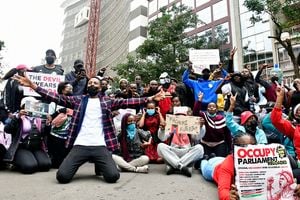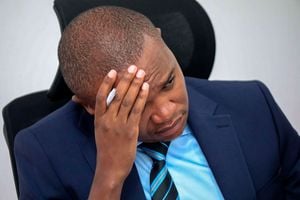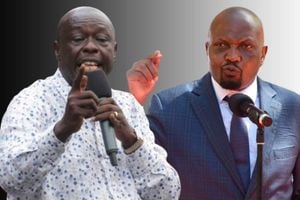We should think creatively to fix this country’s problems

Public service sector union members participate in a procession outside Parliament in Nairobi on May 29, 2023, protesting against the punitive taxes by the government.
Kenya needs a quick fix to its problems right now. The country is in deep economic, social, political, spiritual and cultural trouble. There is hardly a sector of the country, going by pronouncements by political and public leaders and reports from the media, which is working.
Schools are struggling with a new syllabus and poor funding. Hospitals are struggling to treat patients. The economy is struggling. Companies are sending workers home. Prices of goods and services are soaring. The shilling is struggling to keep pace with other currencies. The government wants to tax Kenyans more because it is broke.
But how did Kenya reach this stage? For a country that has been independent for the past 60 years, why are narratives of illiteracy, poor health, underdevelopment, ethnonationalism, favouritism, nepotism, marginalisation of regions and people etc still so pervasive? Wasn’t the struggle against colonialism a struggle to emancipate all Kenyans, irrespective of tribe, region, religion, caste, class, education etc? Don’t all Kenyans deserve a decent and affordable life?
Don’t all Kenyan children deserve to go to school to the highest level, guaranteed by the government? Should any sick Kenyan be turned away from a hospital because they can’t pay for services and medicine? Shouldn’t all Kenyans who qualify for a job be given a chance irrespective of their tribe, political affiliation or gender?
Well, Mbugua Ng’ang’a suggests that Kenyans have adequate knowledge and skills to solve the problems that afflict this country. In a collection of thoughts, We Can Fix This Country: Thoughts on Leadership and the Economy (Big Books, 2021), the author has advice for nearly everyone working in any sector in Kenya, literally.
Applicable thinking
This anthology offers simple but absolutely applicable thinking on how to get things working in Kenya. But, as the subtitle suggests, the two big elements to focus on are leadership and the economy.
Leadership is crucial to how societies evolve. The foundations of leadership is the family. In the home, parents can lead their children to economic sustenance if they are ‘open to new ideas and innovation’ as suggested by the author in the essay ‘Encourage families to think sustainably.’ The point the author makes here is that parents can teach the values of self-dependency in their young ones right from home through school into adult life. How? Parents should teach their young ones how to rely on local resources and knowledge to support themselves economically. The alternative to paying one’s bills is to depend on the government, which in turn depends on taxing other Kenyans (a minority) who are doing businesses or are employed.

Mbugua Ng'ang'a's book We Can Fix This Country: Thoughts on Leadership and the Economy (Big Books, 2021).
This is a question that the author addresses in a different essay, ‘Why treasury feels pressure to tax poor businesses.’ Why would the government want to tax revenue and not profit? Businesses can have regular revenue but still make losses. Yet, the government seems to be determined to tax businesses irrespective of whether they are making a profit or not. But why is the government hungry for money and more money? Because it is spending money that it doesn’t have. The government needs to learn (and teach the rest of Kenyans) how to live within its means.
Why is it that Kenyans can’t live within their means? Why are millions of Kenyans (like their government) trapped in debt cycles? Could it be because the school curriculum doesn’t teach Kenyan children about saving, investment and how to spend? Could it be that the country’s system of education, which allocates resources unfairly, doesn’t prepare a majority of young Kenyans for the world after school? Think about it.
Every year, millions of young Kenyans fail to make the pass grade in primary and secondary school examinations. These are young minds that are deemed not good enough to transition to the next level of education or professional training and whose certificate won't help them at all in future. Is it surprising that these millions (surprisingly still, including the ones who passed the exams) end up in a perpetual debt trap?
What We Can Fix This Country suggests is a back-to-the-basics principle for Kenyans and their leadership if they are really interested in recovering the health of their economy, and the life of their country. Kenyans know that investment in technical skills and digital literacy is crucial to the country’s progress. Yet, there are hardly enough resources – financial and human – invested in Technical and Vocational colleges.
The equipment in most of the technical colleges – including universities – belong to the museums in the rest of the world. Some years ago, the government promised a laptop for every child joining Grade One. What happened to this noble idea? Today, we still have university graduates who have never used a computer. How will we join the digital world if we can’t afford basic computer literacy for all school-going Kenyans?
Probably the most important advice in We Can Fix This Country: Thoughts on Leadership and the Economy is in Chapter One, ‘Why we should invest in the marketplace of ideas.’ It is ideas that change the world; not political posturing. Not policy papers. Not parliamentary bills etc. The government of Kenya officials have to be willing to listen to ideas from all its citizens and in turn, invest in institutions and individuals whose only job is to think and innovate. Innovation hubs are now a global phenomenon. Why can’t Kenya put some money in places where young people are encouraged to think critically about local problems and seek solutions?
Why can’t moneyed Kenyans put some of their money that is sitting idly in bank ledgers in ventures? As the author of We Can Fix This Country wonders, why do rich Kenyans continue to invest in land when the rest of the world is investing in ideas and innovation. Saleable land will soon be in short supply. Where will the propertied class invest?
If Kenyans think that there is a pressing need to cure this country’s socio-economic, political, cultural and spiritual problems, then they have to stop thinking prejudicially and become inclusive and open their minds to ideas from everyone. This is the challenge that Kenya’s leadership has to confront urgently. A good starting point would be to read We Can Fix This Country: Thoughts on Leadership and the Economy as a manual.
The writer teaches literature at the University of Nairobi. [email protected]





